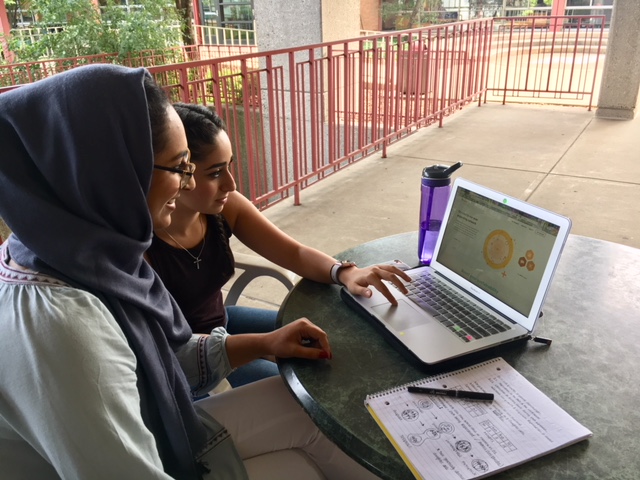Rheaply Provides Free Science Equipment to NEIU’s Biology Department
September 25, 2018

Perhaps the biggest way for education to thrive is by sharing and communicating information. NEIU’s biology department is encouraging this idea by partnering up with Chicago-owned company, Rheaply.
Rheaply is asset exchange manager where students and institutions can share, exchange, rent surplus science equipment and participate in exchanging networks and knowledge.
Before this partnership, the NEIU biology department did not use a platform for gaining scientific research material for classes. The biology department used the word-of-mouth marketing strategy.
“We now [sic] have an opportunity to explore this wider network,” biology professor Dr. Aaron Schirmer said.
Schirmer played a big part in bringing Rheaply to NEIU by forming a connection with Rheaply’s CEO Garry Cooper at the yearly conference of the Society for Neuroscience.
Beginning of fall semester, the NEIU biology department began logging into and populating their Rheaply profile. They have hopes to connect and collaborate with some of the larger industries and institutions that can exchange resources for NEIU faculty to use in their lab classrooms. Students and staff can get “more for less.”
Rheaply was interested in having NEIU be part of their Chicago area test group. Tom Fecarotta, the marketing director at Rheaply, said they are “trying to understand how institutions where research that is happening on either a big or small scale can utilize this platform.”
“Our goal and Rheaply’s goal is that this will spread in other departments throughout Northeastern,” Fecarotta said.
“The familiarity of the website really drew NEIU towards Rheaply,” Schirmer said, “[Rheaply] created a user friendly interface that feels very similar to lots of common online marketplaces like Google Shopping and Amazon.”
“I don’t want to teach students techniques that were used 50 years ago,” says Schirmer, “I want them using the newest, latest, current, techniques and pieces of equipment.”
Partnering up with Rheaply could relieve many costly supplies in the biology department. The two year budget crisis at the university resulted in funding cuts. Schirmer said many supplies were “cut and cut and cut down to the bare minimum.”
Schirmer gives examples of the carts of netbook computers that the biology department uses for projects and labs.
“They are so old, and if we can find something better, it can enhance our ability to teach,” said Schirmer.
Emily Yalda, a biology student at NEIU, was involved in a SCSE research class this summer. Yalda felt that her “research was affected because the equipment was not up to date.”
Yalda said, “I wanted to take a picture of my cell research, but the camera that was connected to the microscope was so bad that I had to use my iPhone to take photos. So if we were to share someone else’s equipment that would really help and give us the right data.”
Cooper said Rheaply “was made with the students in mind … We can help young scientists with mentorship.”
NEIU is one of the first institutions on Rheaply along with Northwestern University in Evanston, Illinois, and other Chicago colleges such as University of Illinois at Chicago (UIC) and Rush University.
Rheaply also recently signed Emory University in Atlanta, Georgia, which is a medical institution that focuses on leading research. This means any NEIU students using Rheaply can form a connection with other students from different universities.
Any current student with an NEIU email can have access to Rheaply. They can create their own profile and interact with fellow students or universities. They can exchange anything from a math tutoring session to a test beaker for a chemistry lab.
“People were sharing items that would typically be for seven grand, and they would get it for free,” Fecarotta said, sharing one scenario that happened at Northwestern’s Feinberg School of Medicine.
The idea of sharing science supplies came from Cooper’s postdoctoral research fellow experience at Northwestern’s School of Medicine where they would throw out unused scientific supplies.
“We don’t know who needs it, but someone can,” said Dr. Cooper. “It’s important to use this value.”
Cooper said he understood firsthand the lack of resources in some schools. He said it opened his eyes.
“I would have never knew the problem if it wasn’t for my time at Northwestern,” Cooper said.
Biology student Aafreen Khatoon felt excited about the partnership and said, “If we have new equipment for the bio labs, it would help us, the students, learn the concepts hands-on.”
Garry Cooper aims at “making the students’ experience a lot more cheaper and collaborative” and wants to make “the procurement of resources as seamless as shopping on Amazon.”
Corrections made:
Rheaply is asset exchange manager where students and institutions can share, exchange, rent surplus science equipment and participate in exchanging networks and knowledge.
“People were sharing items that would typically be for seven grand, and they would get it for free,” Fecarotta said, sharing one scenario that happened at Northwestern’s Feinberg School of Medicine.
The idea of sharing science supplies came from Cooper’s postdoctoral research fellow experience at Northwestern’s School of Medicine where they would throw out unused scientific supplies.








Ena • Oct 10, 2018 at 11:23 pm
Beautifully written!